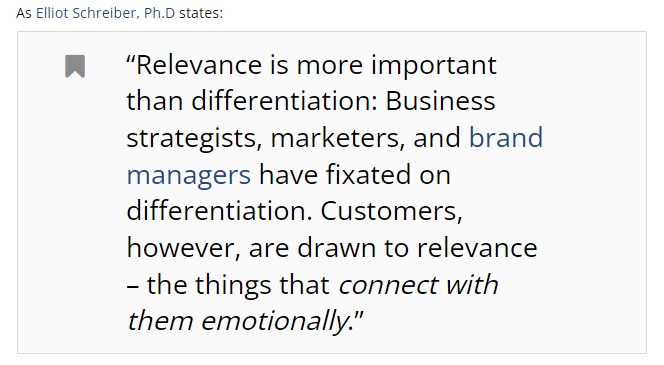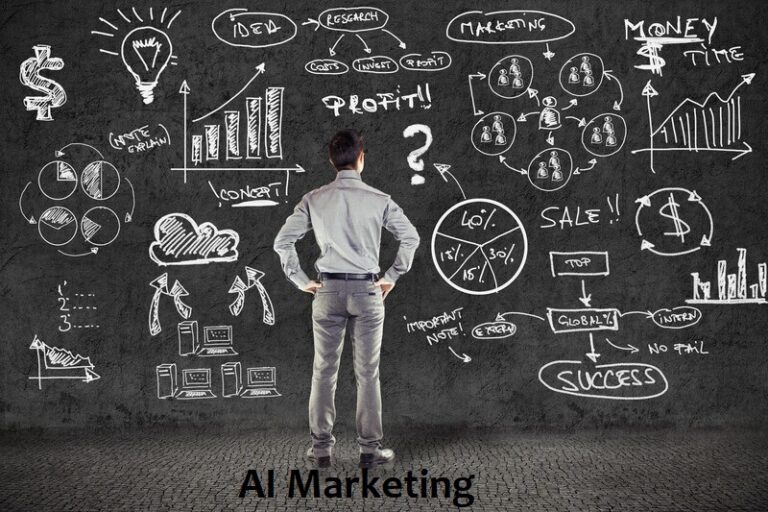Relevance Optimization
Brands come and go. Some live on such as Coke, Apple, Google, while new ones such as Bitcoin, Tesla, and Amazon, arise because they’re somehow relevant to consumers.
If your your traffic, leads, mentions and customer loyalty are eroding, it might not be your product features and benefits. The customer might tell you when they’re breaking up with you that “It’s not you, it’s me.”
The reason for falling performance might be that your brand/product/service mix might not be relevant anymore. Markets change, new offerings come in and a new culture has arisen. This post delves into that issue and cites some points of relevance you need to master to attract today’s new audiences. As you’ll discover, relevance is an advanced marketing topic, yet when you break it down into its components, you can master it.
Why are Our Rankings and Social Media Buzz so Low?
When business owners see their online mentions, traffic, leads and sales slide, they’re not often aware of the source of the decline. And analytics metrics don’t seem to help. They boosted their features and ad budget and still no change. “What is going on?”
While it could be their UVP and benefits aren’t attractive anymore, and competitors might be drawing attention away, it seems as though the market is being driven by a completely different factor.
That factor is relevance. And as you’re about to read, brand relevance has a huge span of influence. There are many elements of brand relevance, which means you can adjust with a new advanced strategy to recapture your receding audience.

What is Relevance?
Relevance is defined as the state of being connected to the matter at hand and purposeful within current culture
Every area of business has its own particular trends and zeitgeist, which can affect the customer’s views and buying preferences.
In business then, relevance is your positioning in the mind of the target customer’s on points of significant meaning to them, right now. Yesterday is behind us. Relevance is completely personal based on current preferences, perspectives and values. It’s all combined and felt by them as a positive or negative emotion — when you build a positive emotion in audiences, you become significant to them. That branding advantage can be your primary advantage over competitors.
A sports star, movie star, billionaire, or social influencer draw followers from different points of relevance. It’s inconceivable that someone such as Kim Kardashian, who isn’t an expert or authority on anything, could sell products. Yet her success tells you a lot about brand relevance and preference.
We need to understand more about what our audience believes is relevant and significant to them. And then we can strategically align our brand with those points of relevance. Up against competition, we can move aggressively and strategically to capture key positions next to these points of relevance.
I speak often of the personalized, significant unique value proposition. Significance is the ultimate expression of relevance. It’s the peak that generates intense preference and loyalty.
Why is Your Brand/Product Irrelevant?
There are key reasons why your brand/product is becoming less relevant. You may not be still investing in the things that were the real source of your previous success, or in what the target market feels is most important now. Times change.
“Brands don’t compete against one another, they compete against irrelevance” — Geoffrey Colon from Branding Strategy Insider
In military marketing execution, you win wars through strategic tactical battling to build relevance. Combat is the persistent communication of benefits that match each prospect personally, and fight off your competitor’s attempt to push you out of relevance leader. That flag they bury in the ground, says “We’re the most relevant.”
When you’re invading a new market, you feel the weight of not being relevant and you wonder how you’re going to be taken seriously. That’s one of benefit of entering a new market. It makes you deal with irrelevance.
So it may not be competitiveness, price, brand promises, or other elements. It could be everything you do that supports and feeds into customer’s emotional preference hierarchy has been neglected. Consumers do respect those professionals/businesses/topics which they feel are relevant, more than the value of the benefits they offer.
Does it matter how good or authoritative your product is or how it’s designed or priced, if the target market sees you as being irrelevant?
Marketing Management might actually be Relevance Management
It’s smart marketers who seek to control and leverage relevance. Relevance isn’t just another metric. It may be the most important and the core of relevance is significance.
10 Signs Your Business is Becoming Irrelevant
Here’s the signals your site is headed for trouble:
- content engagement is dropping
- search engine rankings are sliding downward
- sales volume is decreasing
- fewer customers and websites are citing your brand in their content
- referrals from Google, Bing and Facebook are declining
- customer loyalty and repeat sales are dropping
- fewer customer inquiries
- more shopping cart/visit abandonment
- lower engagement with social media pages and shares/likes decreasing
- fewer referral traffic from other websites
These 10 signals are warning signs that people out there on the Internet are not finding your company as relevant anymore. It’s not just your website or products, it’s your business and brand and more. It’s the company that’s behind all of your marketing, products and services. Your brand has lost its positioning in the market’s mind and is no longer aligned with “core relevance.” You’re on the outside now.
What a Lack of Confidence in Digital Marketing Does
Sometimes, this slide happens when you stop putting a competitive effort with your marketing, advertising, and content creation efforts. Perhaps you’ve been distracted by side projects and product improvements that are moving your core UVP away from core relevance. In this case, no one in the marketplace did anything. You did it yourself.
Visibility and memory are a component as you’ll read below. And if they don’t find you on Google search results, they may conclude the worlds biggest search engine believes you’re irrelevant.
Big lesson in marketing: Don’t become irrelevant too long.
It isn’t enough to be unique with big value. Only when it’s being personalized to customers does it become relevant and truly unique. Personalization is a complex matter because it’s related to focusing relevance to their specific needs and that takes us into the topic of significance to customers.
“Personalization helps the consumer feel like the business they are buying from is specifically relevant to them. The concept of personalization has evolved from simply including a person’s first name in an email to giving customers the relevance they need. It allows companies to offer targeted experiences where the buyer’s journey matches their interests.” — Abhi Yadav, in Forbes article
Everything that is not personally significant just becomes noise to the customer. Often, it’s better to cut down on that noise to create more clarity (less is more).
Brand Irrelevance
A good branding consultant knows all about relevance, but brand significance is at the pinnacle of useful, actionable knowledge.
“A 2015 study by Havas Media Group found that most people would not care if 74% of all brands disappeared completely, and only 28% are said to notably improve people’s quality of life” — Geoffrey Colon of Brand Strategy Insider.
Ask yourself why your market leader is more relevant and why customers care about them.
What Creates Relevance?
Here are 35 factors to consider. Each customer has unique priorities when they choose to mention your brand and buy your offering. Keep that in mind when you try to prioritize each of them for your situation.
- product/service features
- technology benefits/advantages
- industry experience and competence
- political/ethical perspective
- why you do what you do/goodwill/generosity
- brand messaging
- shared values (purpose, end goals, process, benefits, lifestyle)
- shared experiences
- the product discovery experience
- industry event participation
- economic changes
- price and pricing options
- effort required
- age
- gender
- geographic location
- recency/memory
- business type
- web design
- blog content
- marketing pages: service/product mix
- topic mastery
- online visibility/awareness
- industry affiliations
- style
- friend’s and family opinions
- vocabulary and word choices
- visual imagery
- media used (blogs, social, video, podcast, Tedx, news articles)
- personal interests and pursuits
- industry celebrities, experts and influencers
- top brands/credibility/proof/
- certifications and trustmarks
- industry events
- preferred marketing channels
So there are a lot of customer “preferences” to appease to become relevant, especially on a sustained basis. It’s important to identify the top 5 and make sure you nail them.
Mastering Relevance
Perhaps the best way to orient your company, brand and products to customers is to focus on their user experience. Does your brand communicate anything that users generate esteem from? Is it lacking the aura of a sports team that fans rave about? What do your fans rave about your company?
Research gaps in your competitor’s product/service experience.
If you’re selling web design services, relevance comes from viewing images, testing page speed, seeing others using that design (popularity), and clicking around a demo website and testing navigation and presentation. Having the tools and assets for them to use is creating relevancy. You’re giving them everything they need to see that you’re the most relevant. And when relevancy is high, they might think you’re the only provider for them.
If you show competitors who use the design, and emphasize the features/benefits they believe in, then it’s relevant to them. If industry tech experts give the thumbs up to the quality of that web design (mobile friendliness, WordPress enabled, Google amp compatible), and all the technical benefits and stats are laid out, they build trust. Trust and relevance are closely related.
Prioritize Relevance Factors on a Spreadsheet
You must prioritize their relevance factors and create touchpoints for each one. In the case of the web design firm, it’s having a live, testable demo site that’s an important touchpoint. It’s relevant because it lets them check it out so they can make a wise decision on their own.
Relevance then empowers customers ability to make good decisions. To them, each of the relevance factors is a part of the decision process. You want to show you respect their relevance factors.
It’s the same with Google. It prioritizes the content elements they believe decide on which page deserves the top ranking. And Advanced SEO is simply the process of building and optimizing content so it resonates with their relevance criteria. The Core algorithm is simply a relevance algorithm.
Ramping up Your Relevance Marketing
Armed with knowledge of market relevance, you can now recommit to promoting to your audience via the channels they prefer, with the qualities they value most.
After you conduct your relevance research, use your analytics solution to monitor your relevance KPIs. See how your content reach and engagement improve, social mentions grow and how your traffic from all channels increases. Relevance floats all boats in the harbor.
At this point, you need to approach this challenge from a new direction. Don’t use the tired methods/viewpoints which supported your irrelevance. Focus on new content and media which will shake up previous perceptions and give you a new flanking attack strategy to claim new ground and beat competitors.
Advanced SEO Services | SEO Company | Choosing SEO Company | Best SEO Company | Optimization Strategy Techniques Tactics | High Ranking Techniques | Advanced Budget Management | Digital Marketing Audit | State of the Art SEO Software | Brilliant Content Strategy | SEO Expert | SEO Agency San Diego | Advanced SEO Consultant | Linkedin SEO







